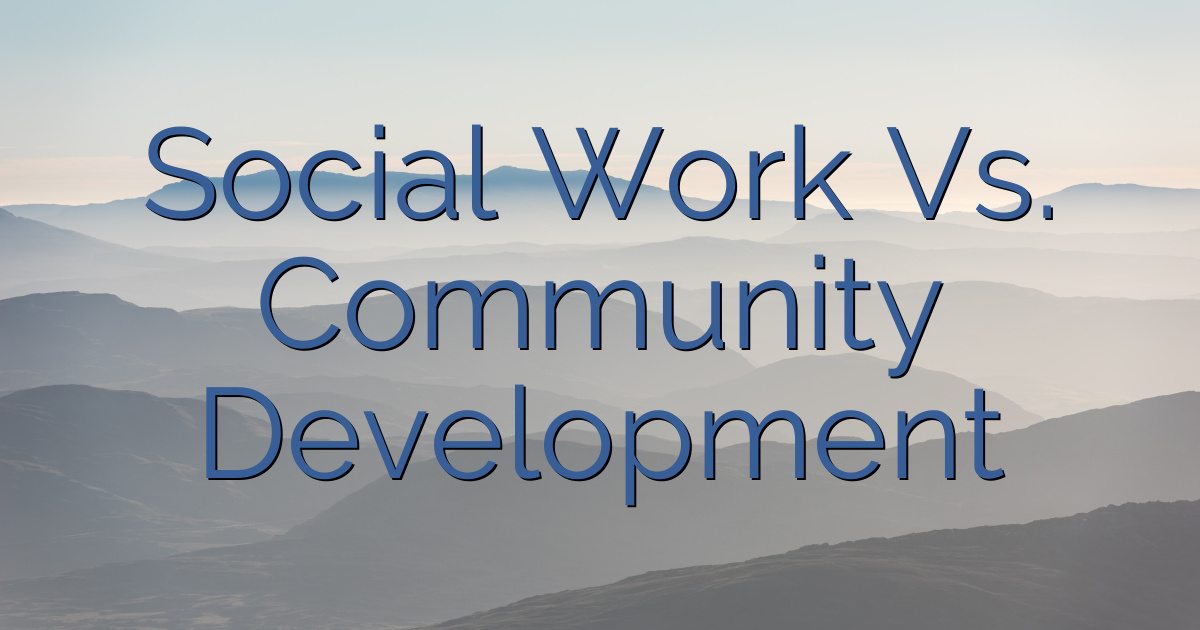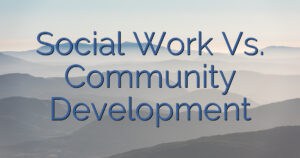 Have you ever wondered which path to choose, social work or community development? It’s a tough decision, but don’t worry – we’re here to help.
In this article, we’ll explore the differences between these two majors, from coursework to career opportunities. We’ll also examine the skills developed in each field, focusing on the importance of interpersonal skills.
So, let’s dive in and discover which path is right for you. Together, we’ll navigate the complexities and possibilities of social work and community development.
Have you ever wondered which path to choose, social work or community development? It’s a tough decision, but don’t worry – we’re here to help.
In this article, we’ll explore the differences between these two majors, from coursework to career opportunities. We’ll also examine the skills developed in each field, focusing on the importance of interpersonal skills.
So, let’s dive in and discover which path is right for you. Together, we’ll navigate the complexities and possibilities of social work and community development.
Table of Contents
Key Takeaways – Social Work Vs. Community Development
- Social work and community development are distinct majors with unique focuses and career paths.
- Both majors cover social justice, human behavior, policy analysis, and community organizing.
- Field placements provide practical experience in real-world settings, allowing students to work with diverse populations and understand their challenges.
- Both majors develop strong interpersonal skills, critical thinking, problem-solving, and the ability to make a positive impact on individuals and communities.
Overview of the two majors: Social Work and Community Development
Social work and community development are two distinct majors with their own unique focuses and career paths. As a student, you will encounter different coursework requirements depending on which major you choose. In social work, you will study subjects such as human behavior, social welfare policy, and practice methods. This coursework will equip you with the necessary skills to assess and address the needs of individuals, families, and communities. On the other hand, community development majors will focus on courses related to community organizing, sustainable development, and social justice. These courses will enable you to understand and promote positive change within communities. Both majors offer field placement opportunities, allowing you to gain hands-on experience in real-world settings. These experiences will help you apply the knowledge and skills learned in the classroom to practical situations, preparing you for a meaningful career in either social work or community development.Overview of the coursework and curriculum of the two majors
The coursework and curriculum of the two majors, social work and community development, provide you with a comprehensive understanding of the field. The coursework content in both majors focuses on various aspects of social justice, human behavior, policy analysis, and community organizing. By studying these subjects, you gain the necessary knowledge and skills to address the complex social issues facing communities today. In addition to theoretical knowledge, both majors emphasize practical application. Through internships, fieldwork, and service-learning opportunities, you have the chance to apply what you learn in real-world settings. This hands-on experience allows you to develop the necessary skills to effectively support individuals, families, and communities in need. The coursework and practical application in these majors prepare you for a rewarding career where you can make a positive impact on society.Overview of coursework, assessments, and field placements
Both majors offer a variety of coursework, assessments, and field placements to provide a well-rounded learning experience. When it comes to coursework requirements, both social work and community development programs emphasize a strong foundation in social sciences, psychology, and ethics. In addition, they offer specialized courses that delve into topics such as community organizing, policy analysis, and program evaluation. These courses equip you with the knowledge and skills needed to address social issues and create sustainable change. Both majors also provide practical experience opportunities through field placements. These placements allow you to apply what you have learned in the classroom to real-world settings. Whether it’s working in a community organization, a government agency, or a non-profit, these placements provide invaluable hands-on experience and allow you to develop professional networks. Furthermore, they give you the opportunity to work with diverse populations and gain a deeper understanding of the challenges they face. Overall, coursework and field placements in both majors ensure that you are well-prepared to make a positive impact in your chosen field.Comparison of Skills Developed in Social Work and Community Development with a focus on interpersonal skills.
You’ll develop strong interpersonal skills in both majors, which will allow you to effectively communicate and connect with individuals from diverse backgrounds. In social work, critical thinking is emphasized as you analyze complex situations and develop strategies to address the needs of clients. This skill enables you to identify underlying issues, evaluate multiple perspectives, and make informed decisions. Problem-solving is also central to social work, as you work collaboratively with clients to overcome challenges and find solutions that promote their well-being. Similarly, community development also fosters critical thinking and problem-solving skills. As you engage with communities, you’ll analyze their needs, assess resources, and develop plans to strengthen social systems. This requires the ability to think critically about the root causes of social issues and develop innovative solutions. Problem-solving becomes essential as you navigate complex community dynamics and address barriers to progress. In both majors, these skills enable you to make a positive impact in the lives of individuals and communities. By honing your critical thinking and problem-solving abilities, you’ll be well-equipped to tackle the challenges and complexities that arise in social work and community development.Comparison of Career Opportunities and Job Roles: Nonprofit Organizations
When considering career opportunities in the nonprofit sector, it’s important to explore the diverse job roles available to you. Nonprofit organizations offer a wide range of positions that allow individuals to make a meaningful impact on society while also experiencing personal career growth. Here is a comparison of career opportunities and job roles within the nonprofit sector:| Job Role | Description |
|---|---|
| Program Manager | Oversees the implementation and evaluation of programs. |
| Fundraiser | Develops and executes fundraising strategies. |
| Volunteer Coordinator | Recruits, trains, and manages volunteers. |
Comparison of Salary Potential in Social Work and Community Development
If you’re considering a career in the nonprofit sector, it’s worth exploring the salary potential in social work and community development roles. While salaries in these fields may not match those in other industries, the rewarding nature of the work and the positive impact you can have on individuals and communities make it an appealing choice for many. On average, social workers earn around $50,000 per year, while community development professionals make approximately $55,000 annually. However, several factors influence salary potential in these fields. The level of education, years of experience, location, and the specific organization or agency you work for can all impact your earning potential. Additionally, specialized certifications or advanced degrees can lead to higher salaries. It’s important to consider these factors when evaluating the financial aspects of a career in social work or community development. By understanding the various factors at play, you can make an informed decision about your career path.Similarities between Social Work and Community Development Careers
Now that we’ve explored the comparison of salary potential in social work and community development, let’s shift our focus to the similarities between these two careers. In both social work and community development, you have the opportunity to make a significant impact on marginalized communities. Here are four ways in which these professions contribute to positive change:- Advocacy and empowerment: Both social work and community development involve advocating for the rights and needs of marginalized individuals and communities. By empowering them to voice their concerns and access resources, you can help create a more equitable society.
- Collaboration and partnership: Collaboration is key in both fields. Social workers and community developers often work closely with other professionals, organizations, and community members to collectively address social issues and implement sustainable solutions.
- Capacity building: Both careers focus on building the capacity of individuals and communities to become self-sufficient and resilient. Through education, skill development, and resource mobilization, you can empower marginalized communities to overcome challenges and thrive.
- Systemic change: Social work and community development aim to address the root causes of social problems by advocating for policy changes and systemic reforms. By working towards social justice, you can help create a more inclusive and equitable society for all.
Difference between Social Work and Community Development Careers
To better understand the distinction between these two careers, let’s delve into the responsibilities and focus areas of each profession. Social work and community development may seem similar, but they have key differences that impact marginalized communities.| Social Work | Community Development |
|---|---|
| Focuses on individual well-being and providing direct services to individuals, families, and communities | Focuses on empowering communities as a whole and promoting sustainable change |
| Involves providing counseling, advocacy, and support to individuals facing challenges such as poverty, mental health issues, or domestic violence | Involves working with community members to identify needs, develop strategies, and implement programs that address social, economic, and environmental issues |
| Aims to improve the overall quality of life for individuals and ensure their access to resources and opportunities | Aims to strengthen community capacity, foster social cohesion, and create a more equitable society |
Factors to consider when choosing between the two majors: job market
When deciding between the two majors, it’s important to consider the job market. Job prospects and employment opportunities are crucial factors to weigh when making this decision. Social work and community development both offer meaningful and impactful careers, but the demand and availability of jobs may differ. Analyzing the current job market can help you make an informed choice that aligns with your career goals and aspirations. Social work is a profession that focuses on helping individuals, families, and communities overcome challenges and improve their well-being. The job market for social workers is generally positive, with a growing demand for professionals in various settings such as hospitals, schools, and social service agencies. However, it’s important to note that competition for certain positions can be high, especially in major metropolitan areas. On the other hand, community development is a field that aims to enhance the overall quality of life in a particular community by addressing social, economic, and environmental issues. Employment opportunities in community development can vary depending on the specific projects and initiatives happening in a given area. Non-profit organizations, government agencies, and community-based organizations are common employers in this field. It’s essential to research and understand the specific job market trends and needs in your desired location.How Does Social Work Relate to Social Justice?
Social work and social justice are closely intertwined, as social workers strive for equitable access to resources and opportunities for their clients. By addressing systemic issues and advocating for marginalized communities, social workers play a crucial role in advancing social justice and creating a more equitable society.

